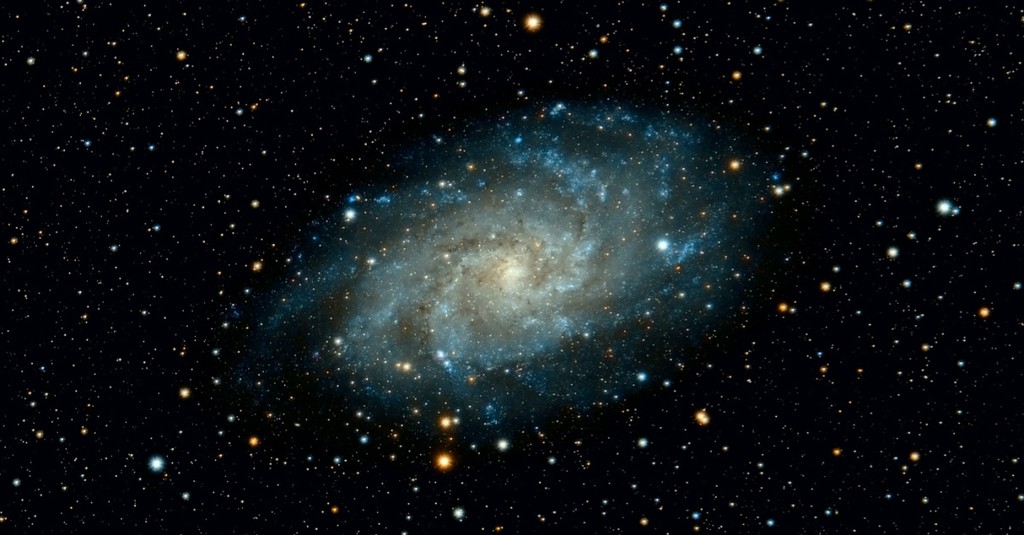
We begin with a thought experiment—one that you may have already tried in the past. Try to imagine that there is nothing. No people, no planets, no stars, no universe, no angels, no God—absolutely nothing. Depending on your temperament and experience, imagining absolute nothingness may be very difficult, perhaps even painful.
Obviously, absolute nothingness is not the case. Something exists. But it is equally obvious, at least to most people, that things could have been very different. As hard as it is to imagine, you might not even have existed. If your biological parents had not come together where they did, or if conception had not taken place when it did, you wouldn’t be here—and arguably, you might never have existed at all. Had that been the case, as much of a loss as that would have been, the human race and the universe would have carried on without you. Painful though the thought may be, we can imagine a world in which we were never born, like George Bailey in Frank Capra’s whimsical film It’s a Wonderful Life.
By the same token, we can imagine a universe in which the human race did not exist. We may feel that the universe would be immeasurably poorer without us, but there seems to be no good reason to think that the universe couldn’t get along without our species. Perhaps the earth could have been populated with the same myriads of plants and animals but without humanity. Or perhaps the universe could have existed as a lifeless place.
What about the universe itself? Granted, it’s here, but could things have been different? Most of us probably have no trouble imagining that the universe might have been a very different kind of universe—say, one in which there is no gravitational force or in which educators make millions of dollars while basketball players make minimum wage. But we’re not sure if such alternate universes would work. What’s really difficult to imagine, at least for some of us, is no universe existing at all. It can be easy to suppose that the universe just is. But is that right?
One of the most famous questions in human history is also one of the most basic: Why is there something rather than nothing? Our interest in this question is not academic. We want to know why something that includes us exists. The question “Why is there something rather than nothing?” is simply a more general, all-encompassing version of the question “Why are we here?”
There are three basic answers to this question:
1. This big something that includes us has always existed for no reason; it just is.
2. This big something that includes us is one big spiritual It; we’re all God or part of God.
3. This big something that includes us was brought into existence by Someone whose existence explains itself – namely, God.
Which of these answers is right?
Photo Credit: ©Guillermo Ferla/Unsplash
1. Atheism
We begin with the least popular, though highly influential, answer: that the big something that includes us has always existed for no reason. In this view, asking why there is something rather than nothing is really asking a nonsense question. The universe is simply a brute fact.
The technical name for this answer is atheism. Atheism is one of several comprehensive beliefs about reality that are called worldviews. A worldview is just what it sounds like—a view of the world as a whole. Anyone who can think about the world as a whole can and does have some sort of worldview, even if it’s not very well developed. If you can read this article, it’s a safe bet that you have a worldview. The question is whether your worldview fits the world in which we all live.
Looking at it in one way, atheism is the simplest worldview. Atheism says that the world exists and nothing else—end of discussion. No God of any kind made the world or lives in or through the world. What you see is what you get.
If indeed the world is self-explanatory—if it being here and it being what it is can be best explained without recourse to any divine power or being—then atheists would have a point. However, there are certain features of the world that make it difficult to view the world as self-explanatory. We’ll mention four of these briefly:
- The world has not always existed. The scientific evidence has now convinced the vast majority of research scientists studying the question that the universe has not always existed—that it had a beginning and is only a finite length of time old. Many scientists came to this conclusion reluctantly; they realized that if the universe had a beginning, a reasonable and perhaps unavoidable inference is that it has a Beginner.
- The world seems to have been “fixed” to make life possible. During the past forty years, scientists have discovered numerous factors in the structure and nature of the universe, the solar system, and the earth that are just what they need to be for biological life to exist. Many of these factors have a very narrow range within which life is possible. In short, it would seem very unlikely that the universe just “happened” by chance to be hospitable to life; it seems more likely that the universe was designed as a home for biological life.
- Biological life itself bears the marks of intelligent design. The complex order of life is of such a kind that its having originated without any purposeful intent guiding its origin seems very unlikely. The problem is compounded when one considers the nature of human beings.
- There is a moral order in the world. It is difficult, if not impossible, to explain why this must be so if one assumes an atheistic, materialistic view of the world.
A worldview needs to be able to account for all of these aspects or features of existence. With that said, let’s now turn to the other major answer to the riddle of existence.
2. Pantheism
This answer agrees with atheism that the big something that includes us just exists for no reason outside itself. However, it disagrees with the atheist assumption that the world is ultimately the material, physical universe that we can see and feel. Instead, this second answer says that the world’s existence is self-explanatory because the world is ultimately a manifestation or expression of infinite Spirit, Mind, or Power. In other words, according to this answer, the world is, in some sense, to be identified as or with God.
The technical name for this worldview is pantheism (meaning the belief that all is God). Pantheism comes in a wide variety of flavors; we will consider the three most representative types of pantheism.
- According to one popular form of pantheism, God alone exists, and everything we think, see, feel, or experience (including our own personal identity) is an illusion. However, in my estimation, our awareness of our own concrete, personal identities is simply too strong for most of us even to entertain the notion that we don’t exist. Even if we were able to entertain the idea, anyone who did would inevitably engage in a kind of inner debate about whether he or she could possibly be a mere illusion—raising the question if the person struggling with the question does not exist, who or what is debating the question?
- According to this second variety of pantheism, God alone exists, and therefore we are all God. The obvious objection to this form of pantheism is to respond, “That’s funny—I don’t remember being God!” If we were God, wouldn’t we all know it?
- The third form of pantheism abandons the strict pantheistic claim that God alone exists. It contends that God and the world are distinct aspects of the totality of all reality. This idea is so different from the other forms of pantheism that it has its own name: panentheism. The “en” in the middle of the word stands for “in,” so the word means the belief that God is in all. (Arguably, then, panentheism is not a form of pantheism but a different worldview.) A popular illustration used to explain panentheism likens God to the human soul and the world to the human body. God is thought of as the soul of the world—the life force or power that energizes the universe, makes the origin and sustenance of life possible, and gives us our moral order.
Panentheism doesn’t put itself in the awkward position of having to claim either that we are all God but forgotten or that we don’t really exist. Also, unlike atheism, it recognizes that the world has features that are difficult to explain on the basis of physical forces inherent in matter. Not surprisingly, a good number of philosophers and religious thinkers have moved toward a panentheistic worldview.
The main difficulty with panentheism can be simply illustrated using the panentheists’ own metaphor of God’s relationship to the world being like that of the soul to the body. In a human being, the soul and body are mutually dependent on one another; neither is complete without the other. (One may be able to exist without the other, but such a state of affairs is not normal or healthy; in fact, it’s called death!) The obvious question is whether God is dependent on the world in the same way that the soul is dependent on the body. Does God need the world in order to live or in order to be complete and whole?
The best explanation is the existence of a God on whom the world utterly depends but who is self-sufficient and not dependent on the world for his life or completeness. This leads us to the third major explanation for our existence.

3. Theism
The traditional answer to the question “Why is there something rather than nothing?” offered in the religions of Judaism, Islam, and Christianity is that God made something that was other than himself. This worldview is called monotheism (which means the belief in one God) or, more simply, theism. According to theism, all existence is divided into two categories: God and everything else. God’s existence is self-explanatory since God is eternal—without beginning or cause of any sort. This God chose to bring into existence everything else. God created the space-time universe and everything in it.
We can argue about whether the act of a Creator God is the only logically possible explanation for our being here, but it’s hard to deny that this is a simple and reasonable explanation. As we have already suggested and will explain in greater depth shortly, this world has characteristics that strongly indicate that the world is not self-explanatory. Why is there something—this something, the one that includes us—rather than nothing? The theist’s answer is that Someone who has always existed, whose existence is in no sense dependent on anyone or anything else, brought everything else into existence. This Someone is commonly called God.
We should point out that theism did not originate as a clever answer to the question of why something rather than nothing exists. Christians don’t claim to have thought about the problem of existence deeply on their own and then one day said, “Hey! I bet God did all this!” Our report is this: God has introduced himself into the picture by revealing himself through the patriarchs, prophets, and apostles of the Bible, and especially in Jesus. If you will, God has come to us and said, “Hey! You see all this? I did that!” But then, having heard this message, we have thought about it and realized that God’s existence is the best explanation for ours.
Photo Credit: ©Getty Images/Alicia_Garcia

Kenneth Boa equips people to love well (being), learn well (knowing), and live well (doing). He is a writer, teacher, speaker, and mentor and is the President of Reflections Ministries, The Museum of Created Beauty, and Trinity House Publishers.
Publications by Dr. Boa include Conformed to His Image, Handbook to Prayer, Handbook to Leadership, Faith Has Its Reasons, Rewriting Your Broken Story, Life in the Presence of God, Leverage, and Recalibrate Your Life.
Dr. Boa holds a B.S. from Case Institute of Technology, a Th.M. from Dallas Theological Seminary, a Ph.D. from New York University, and a D.Phil. from the University of Oxford in England.
Originally published Tuesday, 04 June 2024.
